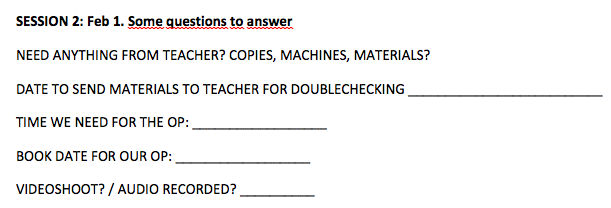Today we started the lesson with me sharing some notions on teacher’s intervention when detecting problematic group dynamics, or people panicking and that panic mounting, which is typical and real when finals approach. You are fortunate to have me as a teacher, because although everybody says it’s useless, I always believe it can help. It can help to use our intelligence to control fears and destroy habits and behaviors that are destructive in terms of making us wiser, freer and all that! 😀
I also spoke about an issue I’ve been observing throughout my life because I’m a pacifist researcher on questions connected to violence. For many years and because I’m a critical thinker, I’ve found how hostile we are, culturally speaking, to questions: we don’t trust questions are just questions, and interpret them as sources of negative things we should avoid. That is why as a thinker I write in favor of people learning to be innocent, i.e., learning to clean their gaze! We have to learn to avoid judging and interpreting, and ask instead, pose clarification questions. Actually, people who have experience on internet communication always recommend that when you find a message that “sounds hostile” or is hostile, you simply take it as a non-hostile message and ask for clarification. Sometimes you realize the person had no bad intention and sometimes your question, your innocent question, which is to say your question refusing taking part in a violent exchange, brings out the best in the receiver, and the reader decides to take a different way, the way of dialogue. Nonviolent communication is a field of study, and by using our intelligence, learning to trust people, learning to know we all might make mistakes, and also that we are all capable of changing our opinions, our believes, and of course, learning to protect ourselves, but in a nonviolent way, not violently, not through that kind of violence we exert with prejudice, with doubting people’s intentions and all that, we can make the world or at least our personal lives a better experience.
So I hope you understand that my words here are not about particular messages we shared, but a long-life kind of analysis by an activist and a teacher.
Don’t be chickens with this absurd thing of exams that do not threaten anything important in your lives. Be loving towards yourself and others. We can change this old-time dynamics.
In case it helps, two practical cases. I told Marina I thought she would learn more if she continued working this year, and took this course again, because I have the feeling that if she could spend more time doing this kind of course, she would enjoy it and improve her English a lot. Of course, I will be happy to see her pass in June if that’s what she wants. Surprisingly, because her level is already advanced, Dessi is considering taking this course again, because she wanted to spend more time discovering things, working on things, developing projects, and this course is that open. Well, I would love to see her again next year, of course, but she’ll mull over this a bit more and finally decide freely. I’m just mentioning this in case it helps you all to take some more pressure off your backs. My frame of mind on this matter would be similar to Dessi’s, because it’s true that reaching a consolidated advanced level takes many years of use of the language and also because it’s hard to find courses offering so much freedom to explore the world and oneself through language. ❤
Finally, if you all pass I’ll be happy. If you all decide to take the course again, I’ll be happy too! (though the authorities will think I’m a hopeless teacher, of course! 😀 )
Well, today we did the C1 listening exercise on friendship, agreed on plans for next day (doing the 2015 June C1 Listening Test after listening to two different OPs and giving these people some feedback) and went through pending things we need to finish so we can work on in class (news extracts and functional translation).
We also devoted some time to your Writing Tests, and I highlighted some ideas for your Proofreading work and LoMs, like working on organizing ideas Before Writing (brainstorming, selecting and ordering ideas, outline), for the sake of textual structure, and checking subjects & verbs first including tenses, and all kinds of agreement (S-V, aux-V, adj-n, including this/these + n, that/those + n.).
A language question that came up was trustworthy / to be worth it / dependable / dependent / dependant.
I have a few other activities for whenever you are ready. Please, let me know. I do hope we can also watch a documentary called How Art Made the World, the episode on how we’ve represented the human body, which is an extraordinary episode. Or a neuroscience documentary on memory.
Finally, I gave out one test for Emilia and María José, and one for Karen, Lucía and Sergio, along with a copy of the test instructions for “parejas and tríos” (Mª José and Emilia, Karen has your copies). Other people need to talk about whether they want to find their partner or me to decide that, so don’t worry if you have no partner.
In the second half of May all of those of you who are sure to come to the Speaking Test in June, will register for this oral. This means, they’ll register in pairs or groups of three, and then I’ll assign a time for whichever date the Head of Studies establishes for the C1 Orals. People who are unsure of wanting to take this exam, shouldn’t register because if they failed to come, that would cause havoc! They won’t lose their right to come to the exam on the date of the oral. It’s just they’ll come at the time non-registered people are summoned (“convocatoria única”, it’s called), usually some time before the registered orals begin. In that moment, if other people come, we’ll form the groups and assign a time, probably after the registered students, or on another day. Another option for the examining board is to add each of the convocatoria única examinees to one of the registered pairs of students, forming groups of three in this way. This would happen if we could not use a second day for orals because our maximum time is four hours of oral exam giving a day (the law establishes we examiners have a half hour break after two hours).
NEXT FRIDAY: At 16.00 Toastmaster, at 18.00 the workshop on Emotional Intelligence. About your E.I. questionnaires: you can give it to Ana, the janitor, if you are not attending the workshop. You can also ask her for the Register for Book Adoptions (1 euro donation).
NEXT MONDAY is a holiday.
Work as hard as you can, and as joyfully as you can, and see you on Friday or next Wednesday! ❤
About yesterday’s talk: I felt priviledged to have the chance to attend a talk by Eulàlia Lledó tailored to what we had suggested.
- I was really happy to see some of you there. Please, feel free to post about the talk, whatever it is you thought, of course!
- For those of you who couldn’t make it to this talk, don’t worry! We have the video!
- For those of you — if anyone is in this case — who did not come probably for being unaware of having an antifeminist prejudice, or a patriarchal heart, which dictates many of our likes and dislikes, and conditions our curiosity, I hope you can watch the video, too, when it’s published! You won’t regret it! 🙂 ❤
- Some teachers told me how happy they were about my work in Coeducación because they were realizing they were actually developing a feminist intelligence! ❤ ❤ ❤ I couldn’t believe my ears! 😀 So I’m extremely happy because the world needs us all to be feminists, like Chimamanda Ngozi Adichie wrote, right? 🙂 ❤
And as I’m on a roll, to celebrate all the good feminism is bringing to the world I’d like to share with you one of my favorite DNVAs (Direct Nonviolent Action), by a German feminist, two years ago on an 8 of March, the Sanitary Pad Street Action…







 We need to learn to be confident and humble at the same time. We need to stop putting this pressure on mistakes. Researchers, artists, creative people in all walks of life KNOW mistakes are crucial for learning and discovery and exploration and making progress!
We need to learn to be confident and humble at the same time. We need to stop putting this pressure on mistakes. Researchers, artists, creative people in all walks of life KNOW mistakes are crucial for learning and discovery and exploration and making progress!